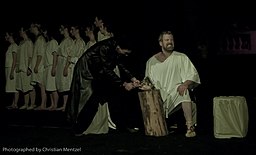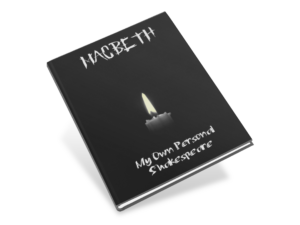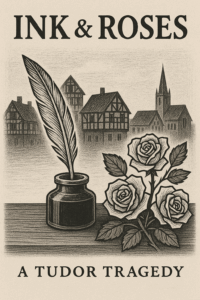Here we go again! As I’ve gotten older I’ve started telling myself, “It’s ok if I miss Shakespeare on Boston Common this year.” The kids have gotten older, schedules are busy. And, perhaps most importantly, they’re doing As You Like It – which they did back in 2008, which I saw, and reviewed.
But then I tell myself, “This is my night. This over all other days is my chance to bask in my Shakespeare world and go surround myself with all things Shakespeare.”

So I did what I also do every year. I dressed up in merch – this time donning my “Shakespeare Makes Life Better” long-sleeve – and filled up my little goodies sack with an assortment of stickers, magnets, and 3D Shakespeares, and we were off. We had a special guest this year, as my daughter’s got a new friend who is both obsessed with Shakespeare and has never been to a free Shakespeare in the park show. So she’s all in.
We stop for gas before heading into Boston, pulling in behind a big (big) pickup truck. That happens to have its backup lights on. So as I get out, not wanting him to roll into me accidentally or something, I say, “Hey did you know that your…” and then they go off. “Never mind, I say.” The driver of the big (big) pickup is a big fellow in his own right. He’s not giving “biker,” but he’s definitely the size and shape of somebody who you wouldn’t want to mess with at the bar.
So he’s pumping his gas, I’m pumping mine, and I can see out of the corner of my eye that he hasn’t stopped looking at me. Have I offended him in some way by mentioning his lights? Does he think I’m stupid because I didn’t know they’d go off? I avoid his gaze for as long as I can.
“Are you an English teacher?” he asks.
I get it immediately. “No,” I say, “Just a fan.” He looks confused. “I assume you’re referring to my shirt?” I ask.
“Yeah,” he says.
“We’re big Shakespeare fans. We’re actually going in to Boston tonight to see Shakespeare in the Park.”
“Oh,” he says. “What play?”
“As You Like It,” I tell him.
“That’s a good one!” he says, looking … wistful? I wonder what he was thinking.
So, that’s one Shakespeare encounter I did not expect. You never know who you’re going to connect with around Shakespeare.
We get to the park, and the normal routine begins, which basically amounts to keeping busy for almost 2 hours waiting for the show to begin. I take the easy way out of my mission, handing my bag of Shakespeare goodies to the kids and saying, “Your mission is to find people to give stuff to.” And off they go. Once they’re gone I of course think, “I should have kept some for myself, I hope they don’t give everything away.” But they don’t, they’re back soon enough to let me know that they gave out some stickers.
The night progresses, the crowd grows There are volunteers walking around who have programs to give out, as well as stickers of their own. The longer I wait, a plan forms in my head. I’ll give something to a volunteer. I’ll tell them, “How often does somebody give you something?” I have two 3d printed Shakespeares left. One is bigger than the other. I will wait until one of the volunteers comes by alone because it would be rude to give two different sizes. Yes, I think about these things. Maybe it comes from having kids and having “everybody gets the same” drilled into my brain. Or maybe I’m just thinking of excuses to chicken out like I do every year.
The darker it gets, the less they wander, and I’m missing my opportunity. Finally a young man walks by who we’ve already seen before. He’s given a program and stickers to the young couple next to us. He’d asked me if I needed a program, too, but we already had a couple. I try to get his attention, but he walks past, and I think that’s it, it’s dark, show’s starting, my chance is past.
Until he’s standing next to me. “Did you need something?” he asks.
I brandish a tiny Shakespeare. “For you,” I say.
He’s speechless. “Wait, really?” he says. “Seriously?”
“You’re out here giving everybody free stuff, how often does anybody give you anything?” I ask.
“Never!” he says, “Nobody’s ever given me anything!”
“Well exactly!” I tell him. “Now you can go show off to the other volunteers that you got something.”
And he does, I watch as he goes over to the two nearest volunteers to excitedly show them his prize, gesturing back at me (probably, “Look what the guy in the Shakespeare Makes Life Better shirt just gave me!”) One of them looks over to me, I make eye contact and smile. Had she come over, I would have given her the other Shakespeare. I don’t know what I would have done if both of them had.
It gets better.
I’m enjoying this. I made somebody happy with Shakespeare. Many people have commented on my shirt. It’s a good night, I don’t want it to end (even though the show hasn’t even begun!) The young woman next to us has been friendly and polite, having first asked if she could sit there (not a courtesy that is always shown), and asking me questions about how the show is organized. So I fish one of my magnets out of the bag and reach it over to her. “Would you like a magnet?” I ask. She definitely would. There’s a funny age gap at work here – as somebody of Dad age, I think that giving out stuff like stickers is childish and, no, nobody wants a sticker. But I have yet to meet a 20-something, all my kids now included, who doesn’t say, “Hell yeah I want a sticker.” Or in this case, a magnet.
“You’re bringing so much joy,” she says.
She has no idea how much that meant to me. I’ve tried to build up the courage for years to be the guy who exudes Shakespeare wherever he goes. “Shakespeare makes life better” isn’t just a tagline for a website. I deeply and truly believe it and want to put actions to words. Tonight, finally, I got to do that. I got to bring joy to people, through Shakespeare, and even have it acknowledged. I don’t remember when I’ve been happier.
This is a long post, and I never even talked about the play. I guess that’ll have to be part two!






